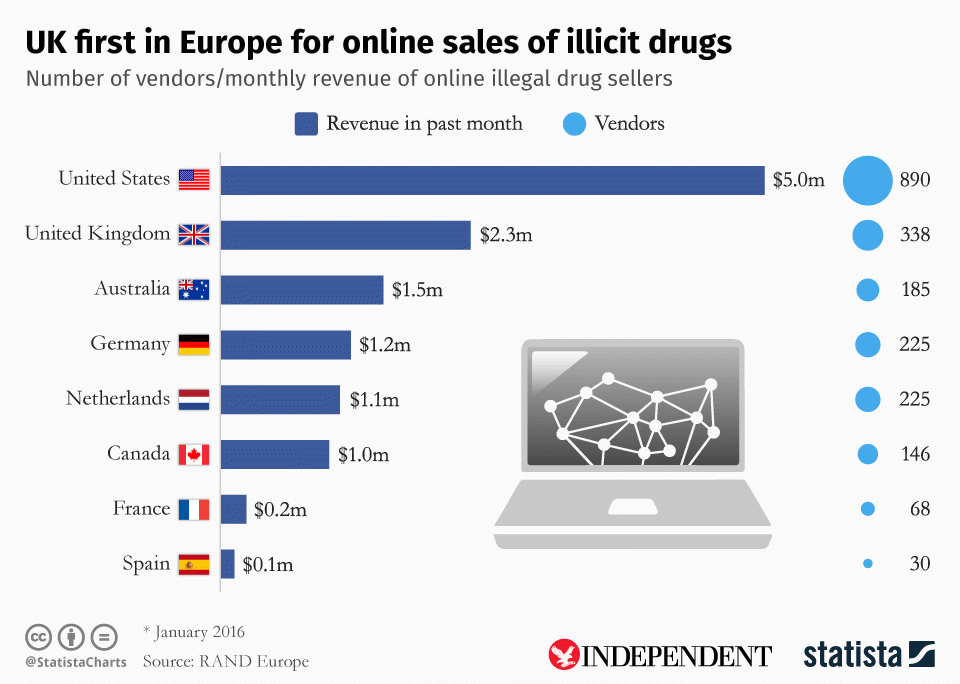Britain’s booming online drugs market proves ‘utter futility of the war on drugs’, campaigners say
The UK’s dark web drugs market now dwarfs any other in Europe

A new study revealing that the UK has Europe’s largest online market for illegal drugs proves the “utter futility of the war on drugs”, reform campaigners have claimed.
After investigating eight of the world’s largest "dark web" market places, researchers for the Rand Europe think-tank found that the UK’s online drugs trade dwarfed that of other European countries and was second in size only to that of the US.
UK dark web sellers were doing 20,748 drug deals worth £1.8m a month – nearly double the 11,039 deals worth £920,000 in Europe’s second largest online drugs market of Germany.
The US had a larger online drugs market, with 28,883 deals worth £3.8m detected in a month, but when relative population sizes were accounted for, the UK had 321 monthly online drugs transactions per million people – more than three times the 90 transactions per million in America.
Rand Europe’s Internet-Facilitated Drugs Trade report also found that the FBI’s success in shutting down the massive dark web marketplace Silk Road in October 2013 did very little to stop the growth of online drug dealing.
Silk Road accounted for nearly all the world’s dark web drug dealing when shut by the FBI, but the report found that by January 2016 the number of monthly online drugs deals had nonetheless tripled, producing global revenues of £10.7m a month – double the £5.35m income generated by Silk Road in its final weeks.
Steve Rolles, a senior policy analyst at the Transform Drug Policy Foundation, which campaigns for the legalisation and Government regulation of drugs, said: “This highlights the utter futility of the war against drugs.
“Each time they shut one down, another site pops up. The idea that eradication or a drug free society can be achieved through enforcement is clearly ridiculous.”

Mr Rolles added that the size of the UK’s online drugs market, accounting for 16 per cent of global dark web dealing examined by researchers, conformed to the historical pattern of the UK consistently being found to have among the highest rates of drugs consumption in Europe.
The UK’s online drugs market, he said, was likely to continue growing as more and more drug users learned how to access the dark web.
“This is the reality UK policy makers have to deal with,” said Mr Rolles. “Clearly an enforcement response does make that problem go away. It just pushes the market somewhere else. The constant mutation and adaptation of the online drugs market is yet another very good example of the futility of an enforcement response.”
This was especially so, he added, because of the money that could now be made through dark web drug dealing.
The report found that the most successful dark web dealer was making £211,592 a month, ten times more than the most successful seller in 2013.
For the average dealer, revenues had increased sevenfold since Silk Road closed in 2013, partly because sellers had become much more active.
Figures from the report also suggested that the UK had the "hardest working" online drug dealers, with the 20,748 deals in January being conducted by 338 sellers.
The rate of 61 sales a month per dealer was significantly higher than in any of the other countries surveyed, with only German dealers, with a monthly rate of 49 sales per individual, being anywhere near as active.
While online drugs sales – amounting to £16m a month at most – are, for the moment at least, dwarfed by offline sales which reach about £1.7bn in Europe alone, the report found possible links between the two markets.
The researchers estimated that between two and six per cent of dark web drug deals – accounting for at least a quarter of all revenue generated online – were "wholesale" purchases, presumably by criminals who planned to sell the substances on the street. The most expensive ‘wholesale’ purchase was a £300,000 order for 10kg of cocaine.
Mr Rolles, who has recently spent time testing drugs at festivals and finding that criminals were duping unsuspecting users into consuming ground up cement or snorting crushed anti-malarial pills, said: “As this report shows, you have to decide between leaving the market to organised crime, street dealers and unregulated online outlets, or having the Government take control and reduce harms to users and the wider community.
“It’s basically a choice between Government regulation and gangsters.”
The Home Office said drug misuse in England and Wales had dropped from 10.5 per cent in 2006 to 8.4 per cent in 2016.
A spokesman said: "Drugs ruin lives and we owe it to all those who have lost loved ones to do everything we can to eradicate this harmful trade. Over the last decade we have seen a reduction in drug misuse by adults and young people and online purchasing of drugs remains a small element of overall drug supply in England and Wales.
"But we are not complacent - the National Crime Agency and police employ a number of tactics to keep drugs off the street. And we continue to work with internet providers to shut down UK-based websites found to be committing offences, building on work already underway to tackle the supply of illegal drugs in the UK and overseas. We also take action across education, prevention, treatment and recovery to reduce harmful drug use.”
Join our commenting forum
Join thought-provoking conversations, follow other Independent readers and see their replies
Comments
Bookmark popover
Removed from bookmarks